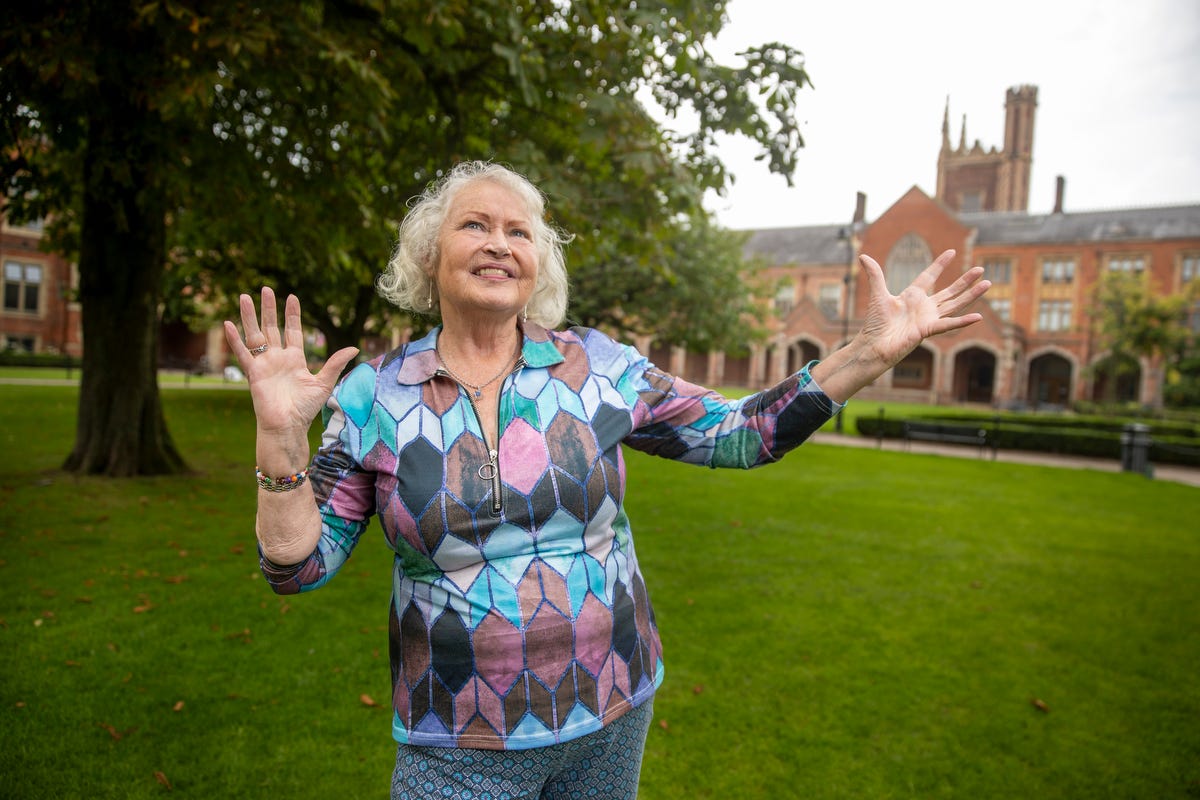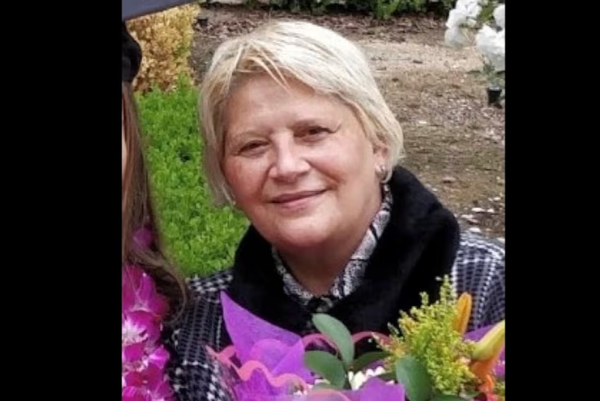
A former art teacher with terminal cancer has said donating her biological samples for medical research and leaving a gift in her will is the “best legacy” she can leave.
Alison Torrens, from Portstewart, has given consent to donate her own surgical samples to a new research project she is funding via the Northern Ireland Biobank.
Ms Torrens has also left a gift in her will to Queen’s University Belfast to help fund the project into adenoid cystic carcinoma (ACC), the cancer type that she has.
She came across the Patrick G Johnson Centre for Cancer Research (PGJCCR) at Queen’s when she was first undergoing cancer treatment in 2016.
“When you’re sitting on the cancer conveyor belt every day, waiting for the little red light to buzz for your radiation, I found it more interesting to look at leaflets and pick up things, and then I saw the Queen’s Research Centre, and I thought ‘I wonder what they do there’,” she said.
After being asked whether she would be interested in donating her own cells taken in biopsies as part of her treatment, Ms Torrens said it was a “no-brainer”.
“I said, sure, you already have my cells and if it’s going to help somebody else later down the line then, yes,” she said.
“And he (Ms Torrens doctor) said ‘you’re ok about signing the form?’ That’s all I had to do it wasn’t costing me anything.
“And that’s the other thing is why I’m compelled to do what I’m doing today, is we get free treatment.
“I have battled three tumours since 2016.
“The treatment I have received from my consultants, and the nursing staff and all of the hospitals I have attended, of which there are three, has been exemplary.
“And the least I can do is just sign to have my cells taken and used for research.
“You know, it’s very little to give back.”
Adenoid cystic carcinomas are slow growing but highly infiltrative malignant tumours arising from secretory glands, typically the salivary glands of the head and neck.
ACC can be aggressive and hard to treat due to its tendency to infiltrate along nerves.
Ms Torrens became emotional as she said another motivating factor in her choosing to donate to Queen’s in her will, was discovering that two women who lived near her also had ACC.
“They weren’t much younger than me. They were mothers. They’re not here now,” she said.
She added: “It’s treatable if it’s caught in time, but I would like the incurable to become curable.
“So by just giving my permission to the NI bank for cells, and to give a bit of money towards the research, and some PhD student, can actually discover something that can prolong somebody’s life and even better, save someone’s life – then I will pass away a very happy woman because that will be the best legacy I could give to anybody in this life, is life.”
Despite her terminal diagnosis, Ms Torrens has an overwhelmingly positive outlook, an attitude she says she learned from her father.
“My father broke his leg in 17 places when he was 17 and they said he’d never walk again. And my mother always said you’re so like your father.
“Because my father, not only did he walk again but he could nearly beat me at cross country because he was so determined,” she said.
She added: “I got that from my dad because there was no such a thing as giving up. I never have time for whingers.
“Whinging doesn’t make anything better, it just makes you feel bad and everybody around you worse.”
Ms Torrens said she “truly believes” that the research will outlive her once she dies, and encouraged others in her position to donate their biological samples for research.
“I think it would be a proud moment too, that somebody from the Queen’s Research Centre could maybe discover something that would be mammoth in the fight for cancer in general, not just my rare cancer but any cancer.
“So as you sit there and you’ve been given really bad news that your time’s up, think about the person whose time isn’t up yet and offer your cells and sign on that little piece of paper.”
The research project will be carried out at PGJCCR at Queen’s, and will explore why ACC can become resistant to treatment and identify characteristics of the cancer cells that may allow for more targeted and effective treatment.
Helen Carrick, assistant director of philanthropy, at Queen’s said 100% of all gifts left to Queen’s will go towards the donor’s chosen cause, with the majority of donations to Queen’s being left for medical research.
“Eighty-five per cent of the income we receive through legacies is left by donors to support medical causes,” Ms Carrick said.
“This includes funding life-changing research into cancer, diabetes and multiple sclerosis, to develop better treatments and ultimately deliver better outcomes for patients.
“Regardless of size, each and every legacy gift is an investment in the future of education and research in Northern Ireland and beyond. We would like to sincerely thank all our supporters for their generous gifts and for their belief in what Queen’s can achieve with their support.”







